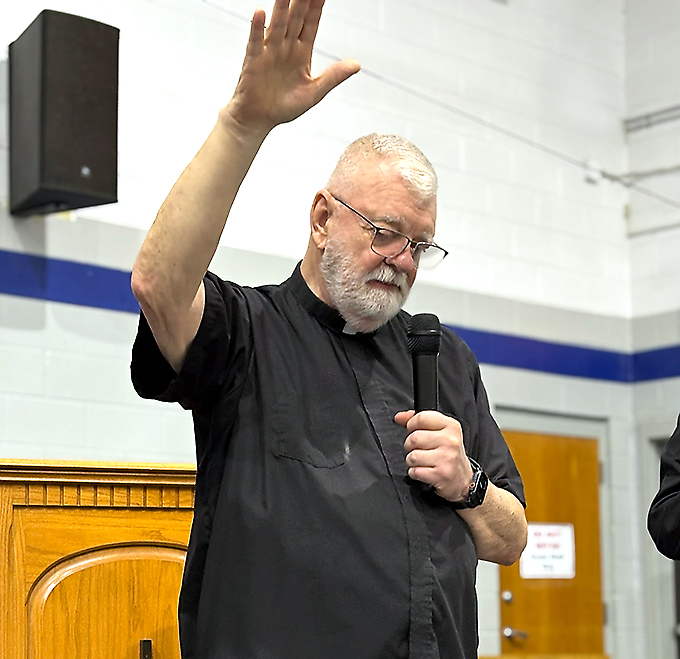Healing from the storm: Fultondale church that reached out to others is now growing quickly
Published 11:03 am Wednesday, May 1, 2013

- The Rev. Ron Gonia, pastor of Fultondale United Methodist Church, led the way two years ago as the church became a “crisis center” following a devastating tornado.
Tornadoes are known for leaving a trail of destruction, but in one case the devastation resulted in growth.
When a tornado roared through Fultondale two years ago last week, it left more than 45 destroyed businesses and houses in its path, along with wrecked trees, downed power lines and other damage. No lives were lost in the city, a fact that Mayor Jim Lowery repeatedly calls a miracle.
One of the few large buildings that still had electricity in the aftermath of the storm was Fultondale United Methodist church.
The Rev. Ron Gonia and his family were at their Fultondale home when the tornado hit. He soon received a call from a church member asking what he and other members needed to do to help others.
Gonia met some of the congregation at the church an hour later. From that point on, the church became a headquarters of rescue operations for north Jefferson County.
For two months, volunteers met at the church to provide countless free meals; cut and remove damaged trees at 157 homes; give out clothing; and provide a place of rest for other rescue workers.
“We really became a crisis center,” Gonia said. “It put our church on the map. We were the one place with power and space. We could provide.”
The activity began to slow down toward the end of June, but Gonia said with a laugh that volunteers are “still on alert.” They remind him from time to time to call them if there are any needs in the community.
In its own way, the tornado provided a sense of community among the members of Fultondale United Methodist Church, Gonia said.
Now, the church is the official city shelter for storms since the former shelter — the library — was heavily damaged by the tornado.
Since church members were reaching outward to the community, no one noticed until after the crisis began to abate that the church itself had received some damage.
“Almost a year after the tornado, we noticed some cracks in our ceiling,” Gonia said. “We thought we were spared by this great storm, but we were really not.”
The church had received substantial wind damage. After working with its insurance company, the building now has a new roof, a new church sign, repairs to the sanctuary ceiling and other repairs.
There have also been other improvements in Gonia’s three years at the church. One of his favorites is a new library, which was created out of a former storage room. The room features wooden shelving, a leather recliner, a wooden table with four chairs, and a place to pray.
One purpose of the library is provide a way for the church to interact with Fultondale High School by helping provide books needed by students.
Besides the library, Gonia has overseen an old fellowship hall transformed into a youth room, and new large appliances purchased for the kitchen.
All of those improvements came about by another positive change at the church: Its finances are now in order.
Gonia said that when he arrived at the church, it was $20,000 in the hole. The church is supposed to pay $15,000 a year to the North Alabama Conference — every Methodist church pays money to the conference; the amount is determined by how many members the church has, according to Gonia.
When Gonia stepped in as pastor, the church was paying only 10 percent of its apportionment to the conference.
“After three years, we’re out of that hole and making our apportionment,” Gonia said. “It’s a great feeling.”
Attendance has also grown at the church, from an average of 75 people three years ago to about 95 people now.
Gonia actually oversees two churches; he is also the pastor at Walker Chapel United Methodist Church. In addition, his wife,
Rachel Radeline Gonia, is the pastor at First Methodist Church in Hoover.
Having three congregations between them keeps life busy, but the couple makes time for family.
Both Gonias take Friday off, and they always spend that day together. And they reserve Saturdays for family; they spend Saturdays with their daughter Jessie, who is 21.
It is not easy for a pastor to have a real day off with no phone calls; he said the only true time he gets off work is when he goes out of town.
“The world doesn’t quit turning; you just have to jump off,” he said about taking days off.
Gonia said his favorite aspect of being a pastor is building relationships with people.
“A pastor gets to see things most people don’t get to see,” he said, such as the faces of a newly married couple when he pronounces them man and wife. “Their backs are to the audience, so nobody gets to see their faces when it dawns on them for the first time, except for the pastor.”
He said pastors are invited in at special moments where most people are not invited, such as death beds, surgeries, tragedies, and even happy moments like anniversaries or the birth of a child.
“I love being involved in people’s lives,” he said. “It’s so cool to see those holy moments.”
Gonia’s personal style is perhaps the reason people are not reluctant to invite him in to their private moments. He describes himself as a traditionalist.
“I’ve done a lot of things that center us,” he said, such as place the pulpit back into the sanctuary, wear the robe and stole that many Methodist pastors wear, and sing and worship in certain ways.
He said people have reacted well.
“I try real hard to be a realistic preacher,” he said. “You’ve got to practice what you preach. Whether you like me or not, I’m pretty real. I’ve got my own stories and my own sins. I need saving as much as anybody else.”
Gonia’s theology is deep, but his philosophy is simple.
“I have always loved God and I have always loved people,” he said with a smile. “Those two should spend more time together.”





